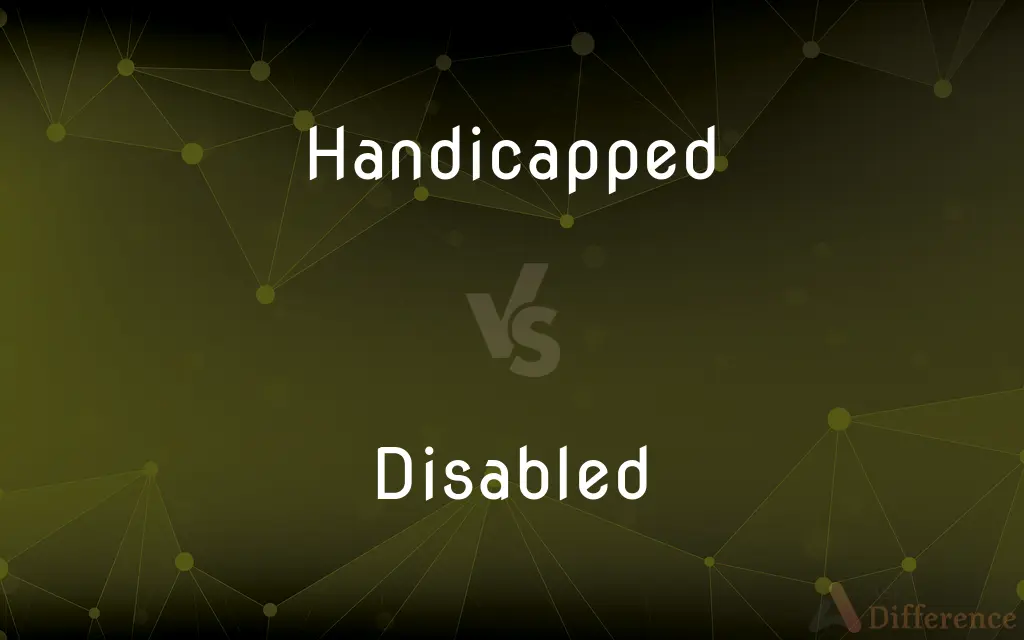Handicapped vs. Disabled — What's the Difference?
By Tayyaba Rehman — Updated on September 22, 2023
"Handicapped" often refers to physical limitations affecting daily activities or societal participation, but is considered outdated and less sensitive. "Disabled" is a broader term that includes physical, mental, and sensory impairments.

Difference Between Handicapped and Disabled
Table of Contents
ADVERTISEMENT
Key Differences
Both "Handicapped" and "Disabled" are used to describe conditions that limit an individual's ability to perform certain tasks or activities. However, the term "Handicapped" has become less commonly used and is often seen as outdated or insensitive. "Disabled," on the other hand, is widely accepted and is considered to be more inclusive and respectful.
When it comes to describing specific conditions, "Handicapped" has been traditionally associated more with physical limitations, often those that are visible. "Disabled," conversely, covers a broader spectrum of conditions, including physical, mental, sensory, and developmental impairments.
The term "Handicapped" originated from the concept of having a "cap in hand," referring to begging, which has led to negative connotations. "Disabled" lacks this historical baggage, making it generally more accepted in both legal frameworks and social discourse.
Although both terms aim to describe conditions affecting an individual's ability to function normally, their usage can impact how those conditions are perceived. "Handicapped" can evoke a sense that the individual is at a disadvantage, while "Disabled" is used in a way that emphasizes the person before the condition (person-first language).
Both "Handicapped" and "Disabled" have been defined in laws and regulations, but "Disabled" is more commonly used in modern legislation and policies, aligning with efforts to be more inclusive and respectful towards individuals with different types of impairments.
ADVERTISEMENT
Comparison Chart
Scope
Traditionally physical
Physical, mental, sensory, developmental
Connotation
Often considered outdated or insensitive
Generally more accepted and inclusive
Historical Origin
"Cap in hand," negative connotations
Lacks such historical baggage
Legal Usage
Less common in modern legislation
More common in modern legislation
Societal Perception
Evokes a sense of disadvantage
Emphasizes person before condition
Compare with Definitions
Handicapped
Handicapped often relates to visible conditions.
Handicapped is commonly used for mobility issues.
Disabled
Disabled is often used with person-first language.
It's more respectful to say person with a disability.
Handicapped
Handicapped can imply a sense of disadvantage.
Being handicapped does not define a person's abilities.
Disabled
Disabled is a term that covers a broad range of impairments.
Disabled people may have physical or mental conditions.
Handicapped
Handicapped is seen as an outdated term.
Many organizations now use disabled instead of handicapped.
Disabled
Disabled emphasizes the person before the condition.
Disabled people are capable of achieving great things.
Handicapped
Handicapped has historical connotations tied to begging.
The term handicapped originated from cap in hand.
Disabled
Having become or having been rendered inoperative
A disabled vehicle.
Handicapped
(of a person) having a condition that markedly restricts their ability to function physically, mentally, or socially
His third child was born severely handicapped
A special school for handicapped children
Disabled
Having a disability
A disabled veteran.
Handicapped
Physically or mentally disabled
A pool equipped for handicapped swimmers.
Disabled
(used with a pl. verb) People with physical or mental impairments, considered as a group. rights of the disabled.
Handicapped
Intended for people who have a disability
A handicapped parking space.
Disabled
Made incapable of use or action.
Handicapped
People who have a disability considered as a group. Often used with the.
Disabled
Having a disability.
Handicapped
Simple past tense and past participle of handicap
Disabled
(legal) Legally disqualified.
Handicapped
Having a handicap.
Disabled
(nonstandard) One who is disabled. often used collectively as the disabled, but sometimes also singular
Handicapped
(derogatory) Limited by an impediment of some kind.
Disabled
Simple past tense and past participle of disable
Handicapped
(India) A disabled person.
Disabled
Injured so as to be unable to function; as, disabled veterans.
Handicapped
Suffering from a handicap (in senses 4 or 5); disabled; at a disadvantage.
Disabled
Unable to function at normal capacity.
Handicapped
Incapacitated by injury or illness
Disabled
People who are crippled or otherwise physically handicapped;
Technology to help the elderly and the disabled
Handicapped
Handicapped refers to physical limitations affecting activities.
The handicapped parking spots are near the entrance.
Disabled
Incapacitated by injury or illness
Disabled
So badly injured as to be unable to continue;
Disabled veterans
Disabled
Disabled is generally more accepted and inclusive.
Many prefer to be referred to as disabled, not handicapped.
Disabled
Disabled is commonly used in modern legislation.
The Americans with Disabilities Act protects the rights of disabled individuals.
Common Curiosities
What is the origin of "Handicapped"?
"Handicapped" has historical connotations tied to begging, with the term "cap in hand."
Are the terms interchangeable?
While they may seem interchangeable, "Disabled" is generally more accepted and inclusive.
Is "Handicapped" an outdated term?
Yes, "Handicapped" is often considered outdated and less sensitive.
Are there synonyms for "Disabled"?
Yes, terms like "differently-abled" or "physically challenged" are sometimes used.
What does "Disabled" cover?
"Disabled" covers physical, mental, sensory, and developmental impairments.
Does "Handicapped" imply disadvantage?
Yes, "Handicapped" can imply a sense of disadvantage or limitation.
Is "Disabled" used in laws?
Yes, "Disabled" is more commonly used in modern legislation like the Americans with Disabilities Act.
What are "handicapped parking spaces"?
These are parking spots designated for individuals with mobility limitations, although the term is being phased out.
Is "Handicapped" used internationally?
The term's usage varies by country, but "Disabled" is generally more universally accepted.
Is "Disabled" person-first language?
Generally, yes. The term is often used in a way that emphasizes the person before the condition.
Do both terms have legal definitions?
Yes, but "Disabled" is more commonly used in modern legal frameworks.
Can businesses use "Handicapped" signs?
While some still do, there is a move towards using more inclusive language like "Accessible Parking."
Is it okay to use "Handicapped" in writing?
It's advisable to use "Disabled" unless referring to a specific historical or legal context where "Handicapped" is used.
Can "Disabled" refer to mental conditions?
Yes, "Disabled" can refer to mental, as well as physical and sensory conditions.
Should I ask someone their preference?
Yes, it's respectful to ask individuals how they prefer to be described.
Share Your Discovery

Previous Comparison
Confident vs. Secure
Next Comparison
Storeroom vs. StorageAuthor Spotlight
Written by
Tayyaba RehmanTayyaba Rehman is a distinguished writer, currently serving as a primary contributor to askdifference.com. As a researcher in semantics and etymology, Tayyaba's passion for the complexity of languages and their distinctions has found a perfect home on the platform. Tayyaba delves into the intricacies of language, distinguishing between commonly confused words and phrases, thereby providing clarity for readers worldwide.














































